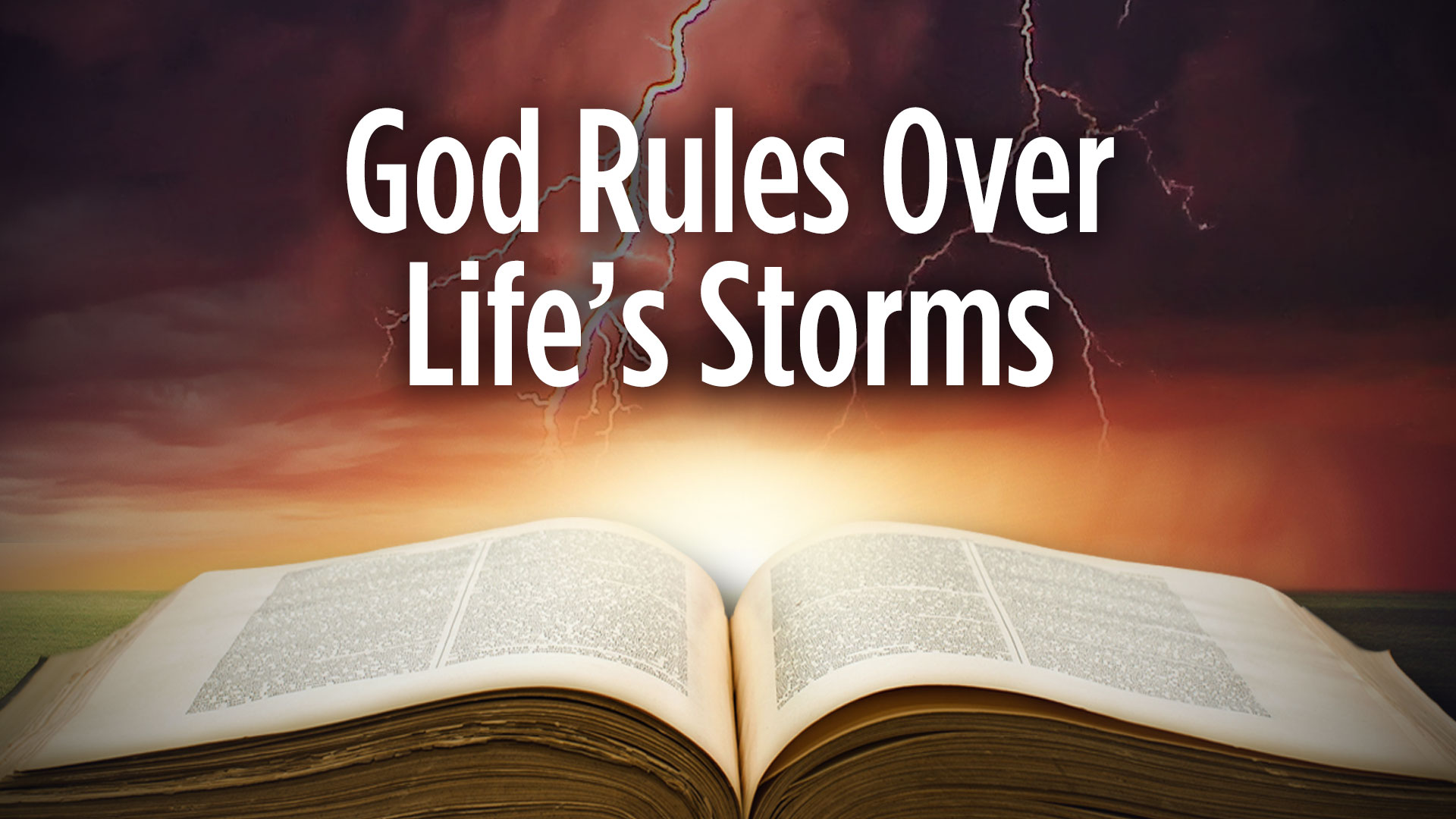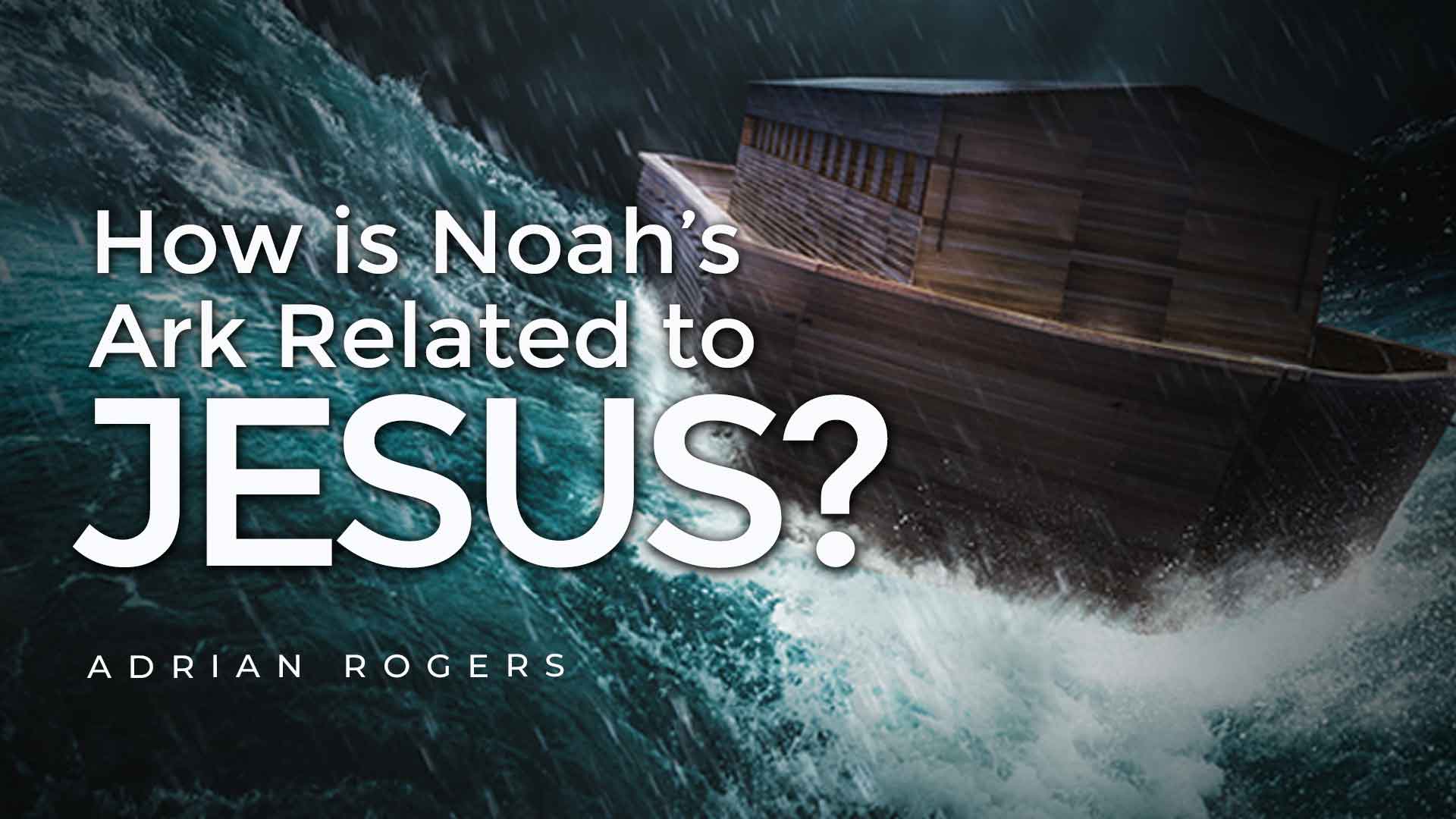

Have you ever been blown off your feet by a physical or metaphorical storm in your life? Are you in that position now and wondering whether you can regain the strength to stand? Are you tired of trying to get up, time and time again, only to be knocked back down? We’ve all been there—and if we haven’t, we will be!
There’s good news for those who are besieged. Jesus Christ can give us the strength not only to stand but also to soar above the storm.
Isaiah 40:31 says, “Those who wait on the LORD shall renew their strength; they shall mount up with wings like eagles, they shall run and not be weary, they shall walk and not faint.”
Pastor Adrian Rogers put it this way: “God promises us the ability to fly in the rugged times of life. And He uses the eagle as an example. The eagle loves the storm. He sits there on his ledge, and when he feels that air being heated by the desert floor and those thermal drafts are coming up early in the morning, he steps off his perch and he lifts those mighty wings of his and begins to soar. And the faster the winds blow, and the more convection there is in the air, he just rises higher and higher. He just soars on the wind.”
There are four categories of storms we’ll consider; in each case, God commands the wind and waves. This is true when the storm is 1) “natural” (one that falls indiscriminately on the just and the unjust) 2) a result of one’s own sin, 3) sent by God to woo someone to Him or to develop His child, and 4) caused by the actions of others (sometimes malevolent actions).
Some storms are unavoidable, but some can be prevented through wise actions on our parts. Once in a storm, the Christian, riding in the Good Ship Grace, is secure and is equipped for an encouraging spiritual outcome; those without Christ are not.
Christians must trust God’s sovereignty even when they are submerged by suffering, forsaken by friends, and dismayed by darkness in the midst of the storm. There is a spiritual place of stillness in the center of God’s will that mirrors the physical eye in the center of a hurricane. From this place, the Christian is not only able to praise God in the storm but is also able to help restore other storm victims with meekness, humility and love.
When you open the 27th chapter of the Book of Acts, you can smell the salt air, watch the lightning strike, and hear the thunder roar. God uses this entire chapter to tell us a story about a ship in a storm. More than history, it is a story of every human being sailing between two eternities. Sometimes good things happen—the sea is calm, the wind blows softly, the sun is shining. Maybe that’s where you are right now; if so, enjoy the voyage. But sometimes the wind rises, the sky darkens, and we find ourselves in a terrible storm.
This is where Paul is in Acts 27. He did not ask for or cause this storm. Paul is a prisoner on a ship on its way to Rome where he will stand trial. He warns the ship’s captain not to sail because he foresees the storm. His advice is ignored, and now an entire crew finds itself in an impossible situation: “Now when neither sun nor stars appeared for many days, and no small tempest beat on us, all hope that we would be saved was finally given up” (Acts 27: 20).
Sometimes others cause the storms we are in. Sometimes, despite all our efforts to avoid trouble, we are beset. Under the guidance of the Holy Spirit, Paul shows us what to do. He remains calm. Because his sins are already drowned—swept away in crimson seas—Paul dwells perpetually in a position of confidence from which he trusts God. In this case, God has shown Paul that he will most certainly stand trial in Rome. So in this moment, when all hope is “given up,” Paul is steadfast. He trusts God not only for his own safety, but for the safety of the entire crew. He reaches out to steady others (even his captors) at the height of the storm. He is able to do this because, in this storm, as in every other, Jesus Himself is the calm. Listen to what Paul tells his shipmates:
“And now I urge you to take heart, for there will be no loss of life among you, but only of the ship. For there stood by me this night an angel of the God to whom I belong and whom I serve, saying, ‘Do not be afraid, Paul; you must be brought before Caesar; and indeed God has granted you all those who sail with you.’ Therefore take heart, men, for I believe God that it will be just as it was told me” (Acts 27:22-25).
And what was the rest of the story? The ship was lost. All those with Paul were safe. And Paul did testify in Rome.
Did someone else cause you to be in a storm? Has God given you a word in that storm? Has He clearly impressed upon you promises from Scripture—in context and in keeping with His revealed will? Hold fast to His promises.

Perhaps, unlike the story in Acts, you are in a storm of your own making. Jonah found himself in a tempest and wound up in the belly of a great fish because of his disobedience. Even so, God used the storm and the fish to teach Jonah about His patience and His mercy. Or perhaps you are in a “pop up” storm—you didn’t cause it, others didn’t cause it, something seemingly just happened. This may be a natural storm—one that falls on the just and the unjust—or it may be a storm God sent for your development. Either way, God will guard you in it, teach you from it, and bring you through it, to Himself.
For more about the types of storms we find ourselves in, read the article "How to Walk Through a Storm."
We are secure in every storm in the Ark of Grace, which is Christ Jesus.
Those from Christian homes grew up on the story of Noah’s Ark. We know it’s true not because archeologists have confirmed stories of great floods in cultures throughout antiquity, though they have, but because it is in the Word of God, and because Jesus Christ Himself confirmed the story in Matthew 24:37, “But as the days of Noah were, so also will the coming of the Son of Man be.” He was talking about the end times—likening the sinful time of Noah to the time just before He will return for His bride, the Church.
The story of Noah’s Ark helps us understand Jesus’ role in the ultimate storm that rages between death and life eternal.
Pastor Adrian Rogers said, “You’ll never see salvation pictured more clearly than you do in Noah’s ark.”
For Noah, the ark provided salvation from worldwide destruction. “The ark is a picture of the Lord Jesus Christ,” Pastor Rogers said. The ark was:

For a fuller explanation of the Ark as a picture of Jesus Christ, read the article, "How is Noah's Ark Related to Jesus?"
The greatest question you will ever face is not, “Does God exist?” This is an easy question with an easy answer. Just look around and inside you. Look around and consider the complexity of the Universe; you know such design requires a designer! Look inside and observe your own intrinsic desire to worship Someone larger, wiser, more powerful, more loving, more everything than yourself! That desire was placed inside you by your Creator, who wants to be in a relationship with you.
No, God’s existence is not the question. When you’re in a storm—you’re bewildered, perplexed, broken—what you really need an answer to is this: Can God be trusted?
No one had more reason to ask this question—or more need for the answer—than the Old Testament character, Job. Though he was a righteous man, Job’s name is synonymous with suffering.
“There was a man in the land of Uz, whose name was Job; and that man was blameless and upright, and one who feared God and shunned evil” (Job 1:1). This man, Job, had easily answered the question of God’s existence. In fact, he had loved and served God with his whole heart. Pastor Adrian Rogers said Job was a great man—spiritually, financially, and domestically.
Satan noticed Job’s love and obedience and desired to have Job for his own. So he asked to “sift” Job, to test him. He believed that if God allowed Job to go through a storm—one that would destroy him financially and domestically—Job would turn away from God.
God allowed Job to be tested. God allowed the enemy to take everything from Job—his wealth, his children, his health—literally everything except his life. Unfortunately, those closest to Job—his three best friends and even his wife—could not be trusted during this time of great calamity. Job’s friends accused him of bringing his difficulties upon himself; Job’s wife told him he might as well “curse God and die” (see Job: 2-9).
With no one on his side, and nothing even to hope for, Job made an astonishing statement in the middle of a fierce storm: “Though He slay me, yet will I trust Him” (Job 15:13). Facing what he thought was his likely demise, Job continued in chapter 19: 25-27—“For I know that my Redeemer lives, and He shall stand at last on the earth; and after my skin is destroyed, this I know, that in my flesh I shall see God, Whom I shall see for myself, and my eyes shall behold, and not another. How my heart yearns within me!”

Do you feel as if you’re being sifted? Do you yearn to behold the reality of God’s love and power? Perhaps you’re in a season of deep uncertainty or loss. Perhaps you’re wondering: can God be trusted? If so, take heart from Job’s story and take a step of faith. Look up and declare, in the middle of your tempest, “Though He slay me, yet will I trust Him.” Job was rewarded for his faith—during his earthly life and through all eternity. He secured the answer to our most difficult question: God can be trusted in trouble? The answer is yes. For more about Job’s faith and reward, read the article, "Can We Rely on God in Difficult Times?"
If we are going to survive the storms of life, we need to remember that, just as he did with Job, the enemy may desire to wage war with us at any time. God may adjust our course to avoid a given storm, or He may command us to gear up for battle.
Adrian Rogers said, “There is a dark, diabolical, deadly, dirty war being fought. It is a war between light and darkness, good and evil, Heaven and Hell, Christ and Satan. You cannot afford to be ignorant and you cannot possibly be neutral.”
Fortunately, we have the tools we need to fight our way out of the storm. In Ephesians 6: 11-13, we read about the purpose of the armor of God: “Put on the whole armor of God, that you may be able to stand against the wiles of the devil. For we do not wrestle against flesh and blood, but against principalities, against powers, against the rulers of the darkness of this age, against spiritual hosts of wickedness in the heavenly places. Therefore take up the whole armor of God, that you may be able to withstand in the evil day, and having done all, to stand.”
These are the weapons we have in Christ Jesus:

With the above tools, we are ready to fight our way out of a storm. For more about Satan’s attacks and the believer’s armor, read the article, "You Cannot Be Neutral in This War."
When a ship is being battered in a fierce storm, discarding heavy cargo is a frequent strategy, but there are certain things that can’t be thrown overboard if the crew is to survive. If we’re going to endure life’s storms, we must learn which burdens we should carry—for ourselves and others—and which we should wisely lay down.
First, let’s consider the burdens of others. If you have brothers or sisters in Christ who are facing storms because they’ve wandered away from God’s protection by falling into sin, you can lighten their load and help them find restoration.
The Bible is filled with examples of believers who faltered and struggled, creating their own spiritual storms. Peter denied Christ. Jonah attempted to escape the responsibility God had placed on him. John Mark became frightened and homesick and abandoned his brothers during a missionary journey. David who fell prey to lust and, eventually, murdered an innocent man.
These believers all failed and were restored. Jesus took up Peter’s burden of denial and personally restored him during a seaside breakfast after His resurrection. God caused a great fish to help restore Jonah to useful service; Jonah’s time in the belly of this fish gave him time to think, to repent, and to get on the right track. A believer named Barnabas helped restore John Mark. If you’ve ever heard a teammate encourage an athlete after a failure in a game, you have an idea what Barnabas did for John Mark: He “picked him up.” As for David, who did something desperately wicked, God sent the prophet Nathan to gently but definitively reveal David’s sin. Nathan bore David’s burden by speaking truth to him, and David was restored.
Pastor Adrian Rogers said we must help broken believers mend—not by shaming, ignoring, or reporting sin to others, but by coming alongside with honesty, gentleness, sympathy, and humility.
While we are to bear one another’s burdens, there are some burdens we must endure on our own. It is our responsibility alone to repent and be saved, and to follow Christ in obedience; no one else can take up these burdens for us. “There are parents who would give the last ounce of blood in their veins if they could repent of sin for their children,” Pastor Rogers said. “But they can’ do it.” When it comes to responding to and loving God, every man must bear his own burden.
“Cast your burden on the LORD, and He shall sustain you; He shall never permit the righteous to be moved” (Psalm 55:22).
King David was an elderly man when he wrote the above words. He’d learned that burdens come to the high and the low, the wealthy and the poor, the saints and the sinners, the young and the old. He’d been restored from some storms of his own making as well as from storms others had caused. And he knew which cargo to throw overboard.
The Apostle Peter also knew. He told us to cast all our cares “upon Him (Jesus), for He cares for you” (1 Peter 5:7). These are the burdens we can do nothing about: the diagnosis with the dire prognosis, the wayward son or daughter who has broken contact, the choking grief after the loss of a loved one. We are to give Christ these burdens and trust Him with the outcome.

Finally, we are to bow before Jesus and give Him the full burden of our sin, guilt, and shame. He has already died to take this burden from us. He longs for us to abandon our attempts to save ourselves from the ultimate storm—an eternity without the love, peace, and joy found only in a relationship with our Creator and Redeemer.
For more about the burdens we take up, carry alone, and lay down, read the article, "What to Do With Your Burdens."
If you’d like to know more about giving your burden of sin, guilt, and shame to Jesus Christ so that you can live in victory even during life’s storms, go to lwf.org/discover-jesus.